Usage of Social Media to Create Brand Awareness of Product Among Consumers: A Cookie Dough T.O
VerifiedAdded on 2023/05/30
|10
|2590
|98
AI Summary
The purpose of this coursework is to study the usage of social media to create brand awareness of product among consumers: A cookie dough T.O (Canadian cookie shop). This research proposal outlines the methodological steps that would make use of in researching this topic.
Contribute Materials
Your contribution can guide someone’s learning journey. Share your
documents today.
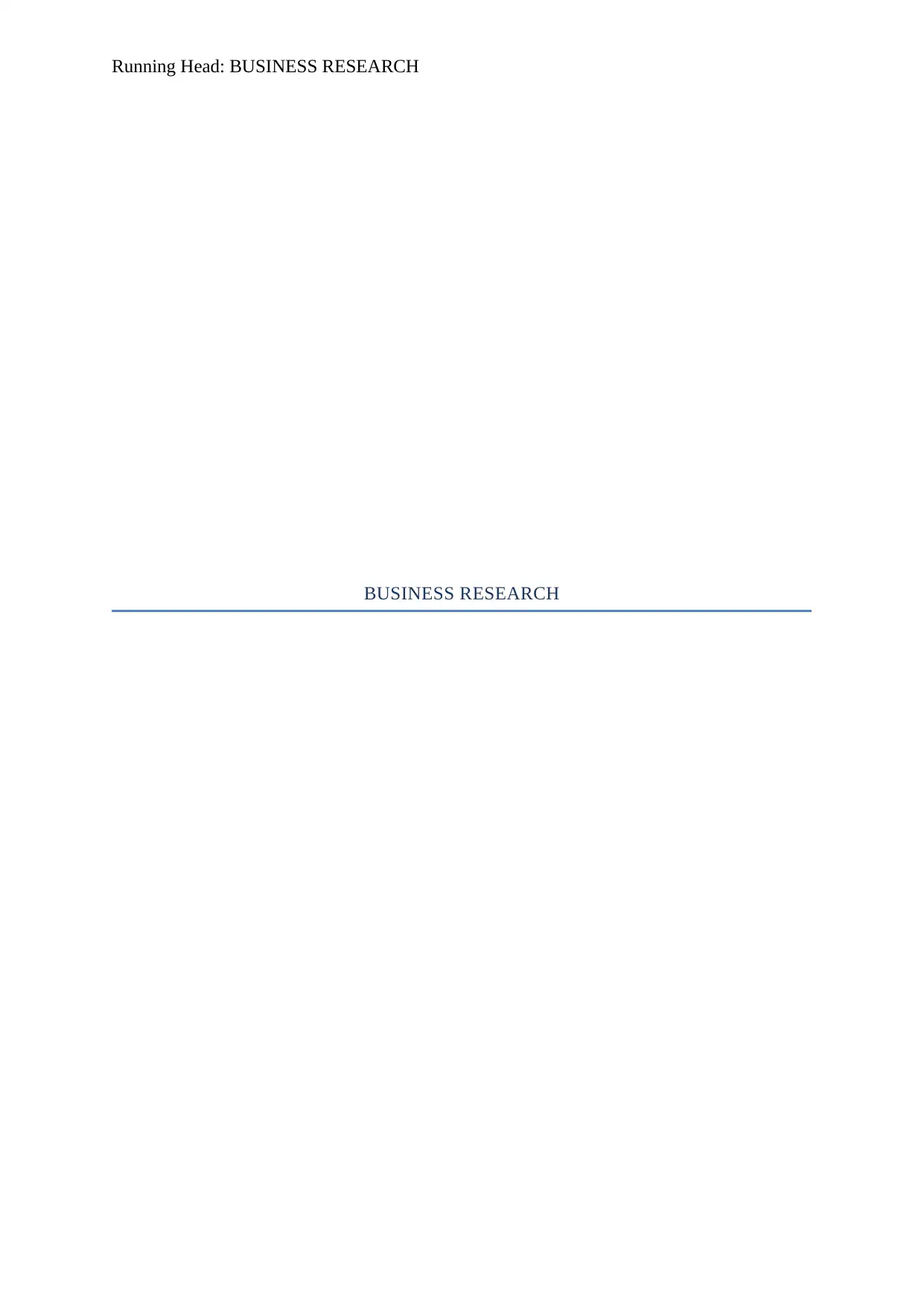
Running Head: BUSINESS RESEARCH
BUSINESS RESEARCH
BUSINESS RESEARCH
Secure Best Marks with AI Grader
Need help grading? Try our AI Grader for instant feedback on your assignments.
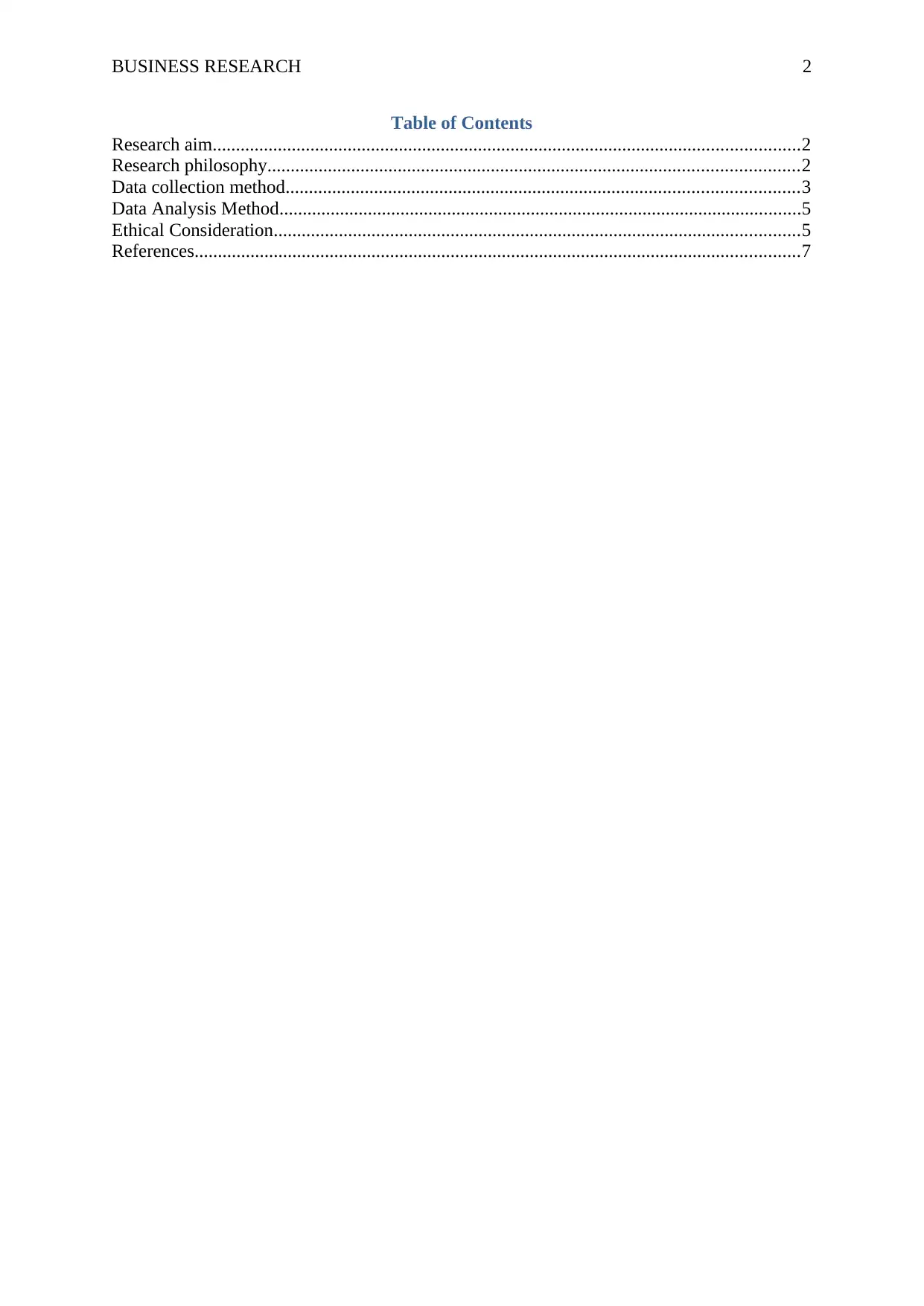
BUSINESS RESEARCH 2
Table of Contents
Research aim..............................................................................................................................2
Research philosophy..................................................................................................................2
Data collection method..............................................................................................................3
Data Analysis Method................................................................................................................5
Ethical Consideration.................................................................................................................5
References..................................................................................................................................7
Table of Contents
Research aim..............................................................................................................................2
Research philosophy..................................................................................................................2
Data collection method..............................................................................................................3
Data Analysis Method................................................................................................................5
Ethical Consideration.................................................................................................................5
References..................................................................................................................................7
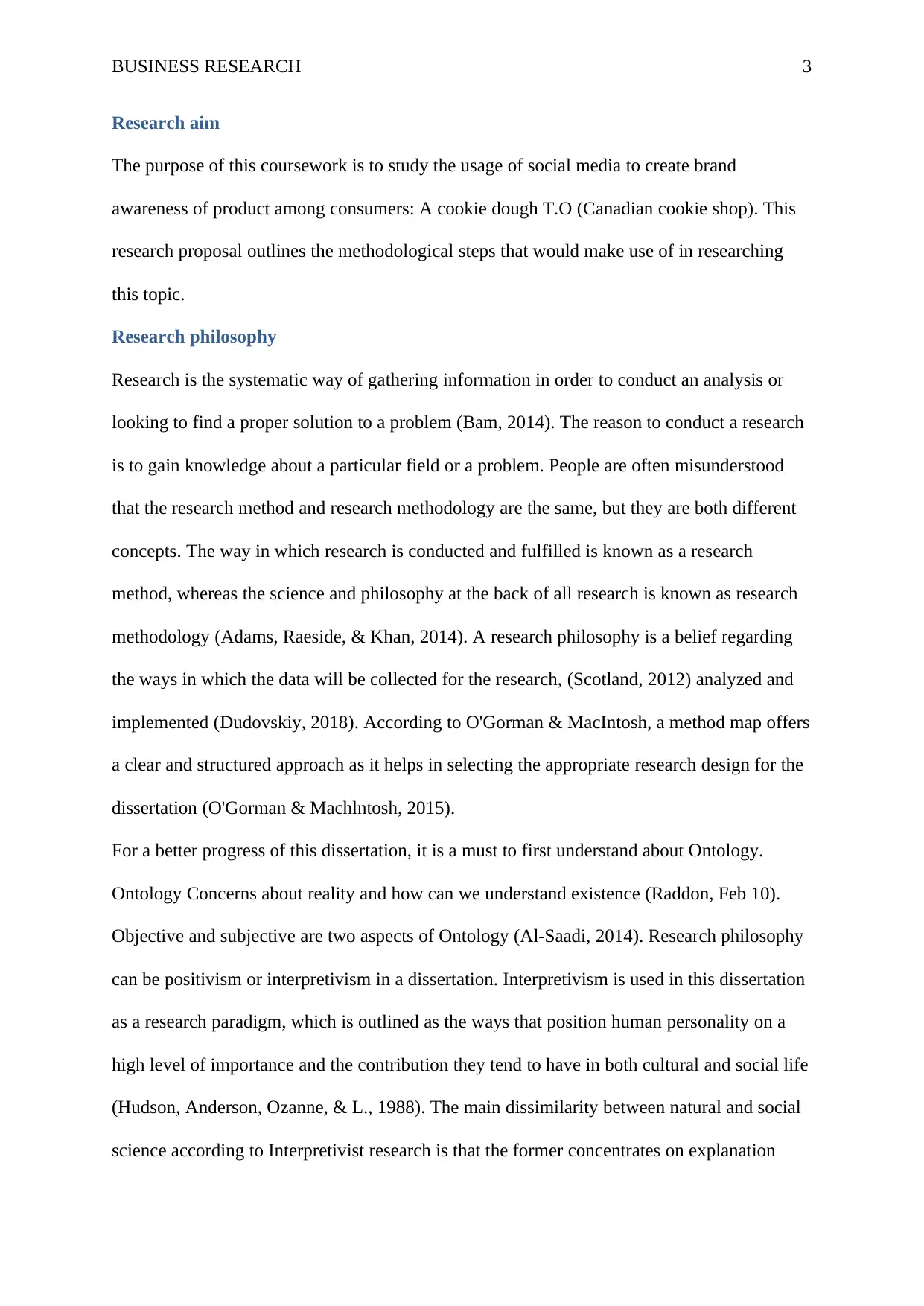
BUSINESS RESEARCH 3
Research aim
The purpose of this coursework is to study the usage of social media to create brand
awareness of product among consumers: A cookie dough T.O (Canadian cookie shop). This
research proposal outlines the methodological steps that would make use of in researching
this topic.
Research philosophy
Research is the systematic way of gathering information in order to conduct an analysis or
looking to find a proper solution to a problem (Bam, 2014). The reason to conduct a research
is to gain knowledge about a particular field or a problem. People are often misunderstood
that the research method and research methodology are the same, but they are both different
concepts. The way in which research is conducted and fulfilled is known as a research
method, whereas the science and philosophy at the back of all research is known as research
methodology (Adams, Raeside, & Khan, 2014). A research philosophy is a belief regarding
the ways in which the data will be collected for the research, (Scotland, 2012) analyzed and
implemented (Dudovskiy, 2018). According to O'Gorman & MacIntosh, a method map offers
a clear and structured approach as it helps in selecting the appropriate research design for the
dissertation (O'Gorman & Machlntosh, 2015).
For a better progress of this dissertation, it is a must to first understand about Ontology.
Ontology Concerns about reality and how can we understand existence (Raddon, Feb 10).
Objective and subjective are two aspects of Ontology (Al-Saadi, 2014). Research philosophy
can be positivism or interpretivism in a dissertation. Interpretivism is used in this dissertation
as a research paradigm, which is outlined as the ways that position human personality on a
high level of importance and the contribution they tend to have in both cultural and social life
(Hudson, Anderson, Ozanne, & L., 1988). The main dissimilarity between natural and social
science according to Interpretivist research is that the former concentrates on explanation
Research aim
The purpose of this coursework is to study the usage of social media to create brand
awareness of product among consumers: A cookie dough T.O (Canadian cookie shop). This
research proposal outlines the methodological steps that would make use of in researching
this topic.
Research philosophy
Research is the systematic way of gathering information in order to conduct an analysis or
looking to find a proper solution to a problem (Bam, 2014). The reason to conduct a research
is to gain knowledge about a particular field or a problem. People are often misunderstood
that the research method and research methodology are the same, but they are both different
concepts. The way in which research is conducted and fulfilled is known as a research
method, whereas the science and philosophy at the back of all research is known as research
methodology (Adams, Raeside, & Khan, 2014). A research philosophy is a belief regarding
the ways in which the data will be collected for the research, (Scotland, 2012) analyzed and
implemented (Dudovskiy, 2018). According to O'Gorman & MacIntosh, a method map offers
a clear and structured approach as it helps in selecting the appropriate research design for the
dissertation (O'Gorman & Machlntosh, 2015).
For a better progress of this dissertation, it is a must to first understand about Ontology.
Ontology Concerns about reality and how can we understand existence (Raddon, Feb 10).
Objective and subjective are two aspects of Ontology (Al-Saadi, 2014). Research philosophy
can be positivism or interpretivism in a dissertation. Interpretivism is used in this dissertation
as a research paradigm, which is outlined as the ways that position human personality on a
high level of importance and the contribution they tend to have in both cultural and social life
(Hudson, Anderson, Ozanne, & L., 1988). The main dissimilarity between natural and social
science according to Interpretivist research is that the former concentrates on explanation
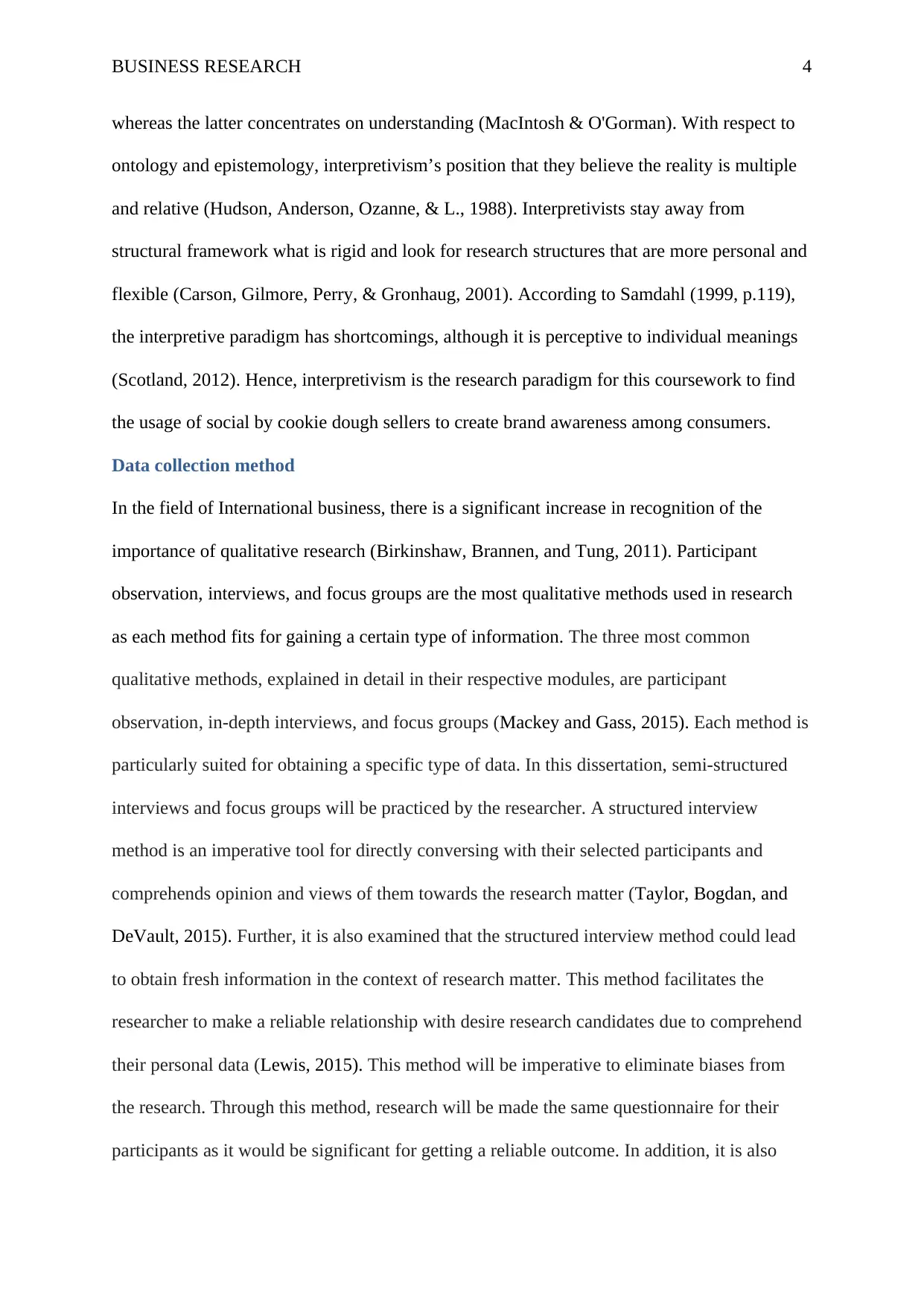
BUSINESS RESEARCH 4
whereas the latter concentrates on understanding (MacIntosh & O'Gorman). With respect to
ontology and epistemology, interpretivism’s position that they believe the reality is multiple
and relative (Hudson, Anderson, Ozanne, & L., 1988). Interpretivists stay away from
structural framework what is rigid and look for research structures that are more personal and
flexible (Carson, Gilmore, Perry, & Gronhaug, 2001). According to Samdahl (1999, p.119),
the interpretive paradigm has shortcomings, although it is perceptive to individual meanings
(Scotland, 2012). Hence, interpretivism is the research paradigm for this coursework to find
the usage of social by cookie dough sellers to create brand awareness among consumers.
Data collection method
In the field of International business, there is a significant increase in recognition of the
importance of qualitative research (Birkinshaw, Brannen, and Tung, 2011). Participant
observation, interviews, and focus groups are the most qualitative methods used in research
as each method fits for gaining a certain type of information. The three most common
qualitative methods, explained in detail in their respective modules, are participant
observation, in-depth interviews, and focus groups (Mackey and Gass, 2015). Each method is
particularly suited for obtaining a specific type of data. In this dissertation, semi-structured
interviews and focus groups will be practiced by the researcher. A structured interview
method is an imperative tool for directly conversing with their selected participants and
comprehends opinion and views of them towards the research matter (Taylor, Bogdan, and
DeVault, 2015). Further, it is also examined that the structured interview method could lead
to obtain fresh information in the context of research matter. This method facilitates the
researcher to make a reliable relationship with desire research candidates due to comprehend
their personal data (Lewis, 2015). This method will be imperative to eliminate biases from
the research. Through this method, research will be made the same questionnaire for their
participants as it would be significant for getting a reliable outcome. In addition, it is also
whereas the latter concentrates on understanding (MacIntosh & O'Gorman). With respect to
ontology and epistemology, interpretivism’s position that they believe the reality is multiple
and relative (Hudson, Anderson, Ozanne, & L., 1988). Interpretivists stay away from
structural framework what is rigid and look for research structures that are more personal and
flexible (Carson, Gilmore, Perry, & Gronhaug, 2001). According to Samdahl (1999, p.119),
the interpretive paradigm has shortcomings, although it is perceptive to individual meanings
(Scotland, 2012). Hence, interpretivism is the research paradigm for this coursework to find
the usage of social by cookie dough sellers to create brand awareness among consumers.
Data collection method
In the field of International business, there is a significant increase in recognition of the
importance of qualitative research (Birkinshaw, Brannen, and Tung, 2011). Participant
observation, interviews, and focus groups are the most qualitative methods used in research
as each method fits for gaining a certain type of information. The three most common
qualitative methods, explained in detail in their respective modules, are participant
observation, in-depth interviews, and focus groups (Mackey and Gass, 2015). Each method is
particularly suited for obtaining a specific type of data. In this dissertation, semi-structured
interviews and focus groups will be practiced by the researcher. A structured interview
method is an imperative tool for directly conversing with their selected participants and
comprehends opinion and views of them towards the research matter (Taylor, Bogdan, and
DeVault, 2015). Further, it is also examined that the structured interview method could lead
to obtain fresh information in the context of research matter. This method facilitates the
researcher to make a reliable relationship with desire research candidates due to comprehend
their personal data (Lewis, 2015). This method will be imperative to eliminate biases from
the research. Through this method, research will be made the same questionnaire for their
participants as it would be significant for getting a reliable outcome. In addition, it is also
Secure Best Marks with AI Grader
Need help grading? Try our AI Grader for instant feedback on your assignments.
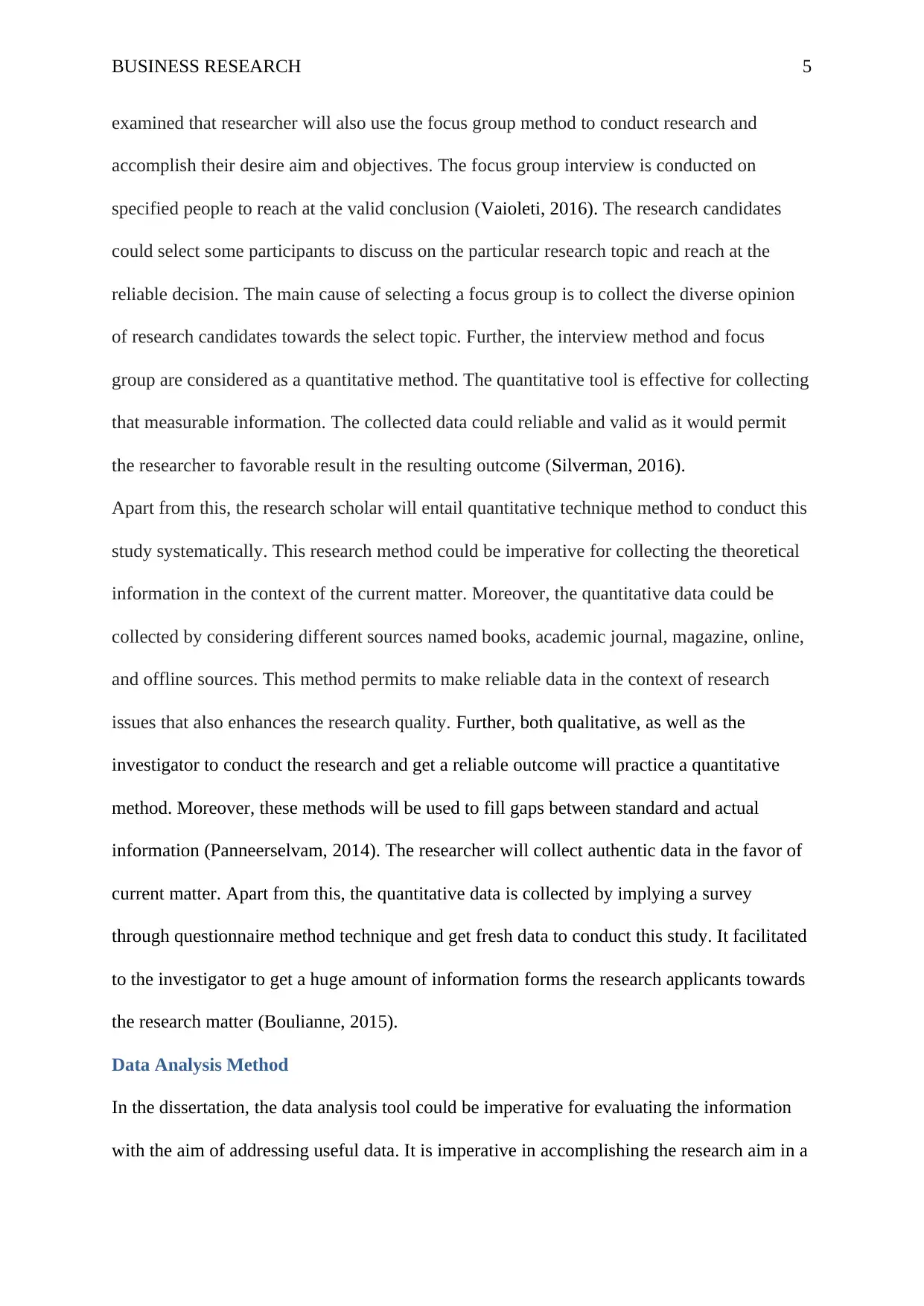
BUSINESS RESEARCH 5
examined that researcher will also use the focus group method to conduct research and
accomplish their desire aim and objectives. The focus group interview is conducted on
specified people to reach at the valid conclusion (Vaioleti, 2016). The research candidates
could select some participants to discuss on the particular research topic and reach at the
reliable decision. The main cause of selecting a focus group is to collect the diverse opinion
of research candidates towards the select topic. Further, the interview method and focus
group are considered as a quantitative method. The quantitative tool is effective for collecting
that measurable information. The collected data could reliable and valid as it would permit
the researcher to favorable result in the resulting outcome (Silverman, 2016).
Apart from this, the research scholar will entail quantitative technique method to conduct this
study systematically. This research method could be imperative for collecting the theoretical
information in the context of the current matter. Moreover, the quantitative data could be
collected by considering different sources named books, academic journal, magazine, online,
and offline sources. This method permits to make reliable data in the context of research
issues that also enhances the research quality. Further, both qualitative, as well as the
investigator to conduct the research and get a reliable outcome will practice a quantitative
method. Moreover, these methods will be used to fill gaps between standard and actual
information (Panneerselvam, 2014). The researcher will collect authentic data in the favor of
current matter. Apart from this, the quantitative data is collected by implying a survey
through questionnaire method technique and get fresh data to conduct this study. It facilitated
to the investigator to get a huge amount of information forms the research applicants towards
the research matter (Boulianne, 2015).
Data Analysis Method
In the dissertation, the data analysis tool could be imperative for evaluating the information
with the aim of addressing useful data. It is imperative in accomplishing the research aim in a
examined that researcher will also use the focus group method to conduct research and
accomplish their desire aim and objectives. The focus group interview is conducted on
specified people to reach at the valid conclusion (Vaioleti, 2016). The research candidates
could select some participants to discuss on the particular research topic and reach at the
reliable decision. The main cause of selecting a focus group is to collect the diverse opinion
of research candidates towards the select topic. Further, the interview method and focus
group are considered as a quantitative method. The quantitative tool is effective for collecting
that measurable information. The collected data could reliable and valid as it would permit
the researcher to favorable result in the resulting outcome (Silverman, 2016).
Apart from this, the research scholar will entail quantitative technique method to conduct this
study systematically. This research method could be imperative for collecting the theoretical
information in the context of the current matter. Moreover, the quantitative data could be
collected by considering different sources named books, academic journal, magazine, online,
and offline sources. This method permits to make reliable data in the context of research
issues that also enhances the research quality. Further, both qualitative, as well as the
investigator to conduct the research and get a reliable outcome will practice a quantitative
method. Moreover, these methods will be used to fill gaps between standard and actual
information (Panneerselvam, 2014). The researcher will collect authentic data in the favor of
current matter. Apart from this, the quantitative data is collected by implying a survey
through questionnaire method technique and get fresh data to conduct this study. It facilitated
to the investigator to get a huge amount of information forms the research applicants towards
the research matter (Boulianne, 2015).
Data Analysis Method
In the dissertation, the data analysis tool could be imperative for evaluating the information
with the aim of addressing useful data. It is imperative in accomplishing the research aim in a
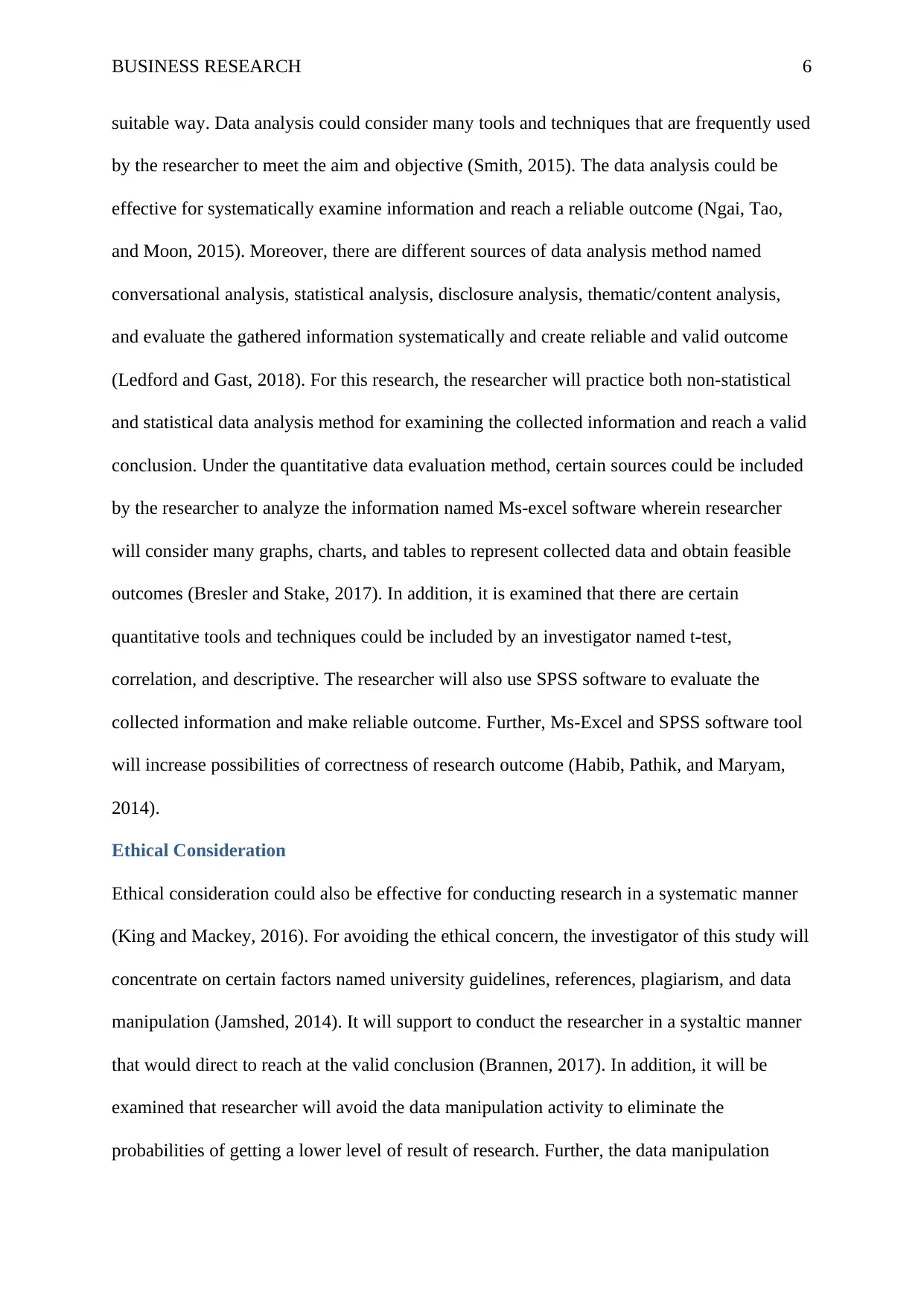
BUSINESS RESEARCH 6
suitable way. Data analysis could consider many tools and techniques that are frequently used
by the researcher to meet the aim and objective (Smith, 2015). The data analysis could be
effective for systematically examine information and reach a reliable outcome (Ngai, Tao,
and Moon, 2015). Moreover, there are different sources of data analysis method named
conversational analysis, statistical analysis, disclosure analysis, thematic/content analysis,
and evaluate the gathered information systematically and create reliable and valid outcome
(Ledford and Gast, 2018). For this research, the researcher will practice both non-statistical
and statistical data analysis method for examining the collected information and reach a valid
conclusion. Under the quantitative data evaluation method, certain sources could be included
by the researcher to analyze the information named Ms-excel software wherein researcher
will consider many graphs, charts, and tables to represent collected data and obtain feasible
outcomes (Bresler and Stake, 2017). In addition, it is examined that there are certain
quantitative tools and techniques could be included by an investigator named t-test,
correlation, and descriptive. The researcher will also use SPSS software to evaluate the
collected information and make reliable outcome. Further, Ms-Excel and SPSS software tool
will increase possibilities of correctness of research outcome (Habib, Pathik, and Maryam,
2014).
Ethical Consideration
Ethical consideration could also be effective for conducting research in a systematic manner
(King and Mackey, 2016). For avoiding the ethical concern, the investigator of this study will
concentrate on certain factors named university guidelines, references, plagiarism, and data
manipulation (Jamshed, 2014). It will support to conduct the researcher in a systaltic manner
that would direct to reach at the valid conclusion (Brannen, 2017). In addition, it will be
examined that researcher will avoid the data manipulation activity to eliminate the
probabilities of getting a lower level of result of research. Further, the data manipulation
suitable way. Data analysis could consider many tools and techniques that are frequently used
by the researcher to meet the aim and objective (Smith, 2015). The data analysis could be
effective for systematically examine information and reach a reliable outcome (Ngai, Tao,
and Moon, 2015). Moreover, there are different sources of data analysis method named
conversational analysis, statistical analysis, disclosure analysis, thematic/content analysis,
and evaluate the gathered information systematically and create reliable and valid outcome
(Ledford and Gast, 2018). For this research, the researcher will practice both non-statistical
and statistical data analysis method for examining the collected information and reach a valid
conclusion. Under the quantitative data evaluation method, certain sources could be included
by the researcher to analyze the information named Ms-excel software wherein researcher
will consider many graphs, charts, and tables to represent collected data and obtain feasible
outcomes (Bresler and Stake, 2017). In addition, it is examined that there are certain
quantitative tools and techniques could be included by an investigator named t-test,
correlation, and descriptive. The researcher will also use SPSS software to evaluate the
collected information and make reliable outcome. Further, Ms-Excel and SPSS software tool
will increase possibilities of correctness of research outcome (Habib, Pathik, and Maryam,
2014).
Ethical Consideration
Ethical consideration could also be effective for conducting research in a systematic manner
(King and Mackey, 2016). For avoiding the ethical concern, the investigator of this study will
concentrate on certain factors named university guidelines, references, plagiarism, and data
manipulation (Jamshed, 2014). It will support to conduct the researcher in a systaltic manner
that would direct to reach at the valid conclusion (Brannen, 2017). In addition, it will be
examined that researcher will avoid the data manipulation activity to eliminate the
probabilities of getting a lower level of result of research. Further, the data manipulation
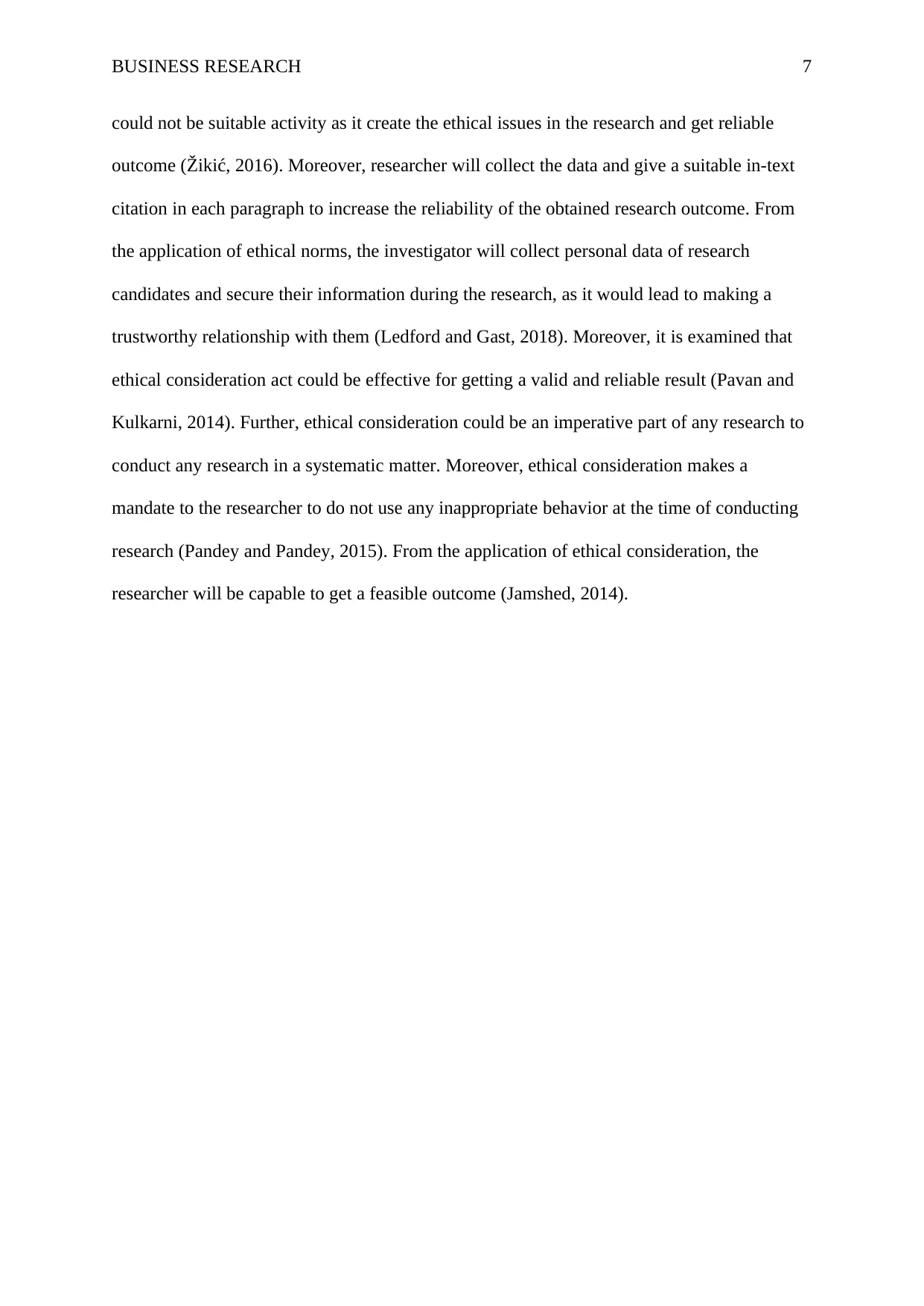
BUSINESS RESEARCH 7
could not be suitable activity as it create the ethical issues in the research and get reliable
outcome (Žikić, 2016). Moreover, researcher will collect the data and give a suitable in-text
citation in each paragraph to increase the reliability of the obtained research outcome. From
the application of ethical norms, the investigator will collect personal data of research
candidates and secure their information during the research, as it would lead to making a
trustworthy relationship with them (Ledford and Gast, 2018). Moreover, it is examined that
ethical consideration act could be effective for getting a valid and reliable result (Pavan and
Kulkarni, 2014). Further, ethical consideration could be an imperative part of any research to
conduct any research in a systematic matter. Moreover, ethical consideration makes a
mandate to the researcher to do not use any inappropriate behavior at the time of conducting
research (Pandey and Pandey, 2015). From the application of ethical consideration, the
researcher will be capable to get a feasible outcome (Jamshed, 2014).
could not be suitable activity as it create the ethical issues in the research and get reliable
outcome (Žikić, 2016). Moreover, researcher will collect the data and give a suitable in-text
citation in each paragraph to increase the reliability of the obtained research outcome. From
the application of ethical norms, the investigator will collect personal data of research
candidates and secure their information during the research, as it would lead to making a
trustworthy relationship with them (Ledford and Gast, 2018). Moreover, it is examined that
ethical consideration act could be effective for getting a valid and reliable result (Pavan and
Kulkarni, 2014). Further, ethical consideration could be an imperative part of any research to
conduct any research in a systematic matter. Moreover, ethical consideration makes a
mandate to the researcher to do not use any inappropriate behavior at the time of conducting
research (Pandey and Pandey, 2015). From the application of ethical consideration, the
researcher will be capable to get a feasible outcome (Jamshed, 2014).
Paraphrase This Document
Need a fresh take? Get an instant paraphrase of this document with our AI Paraphraser
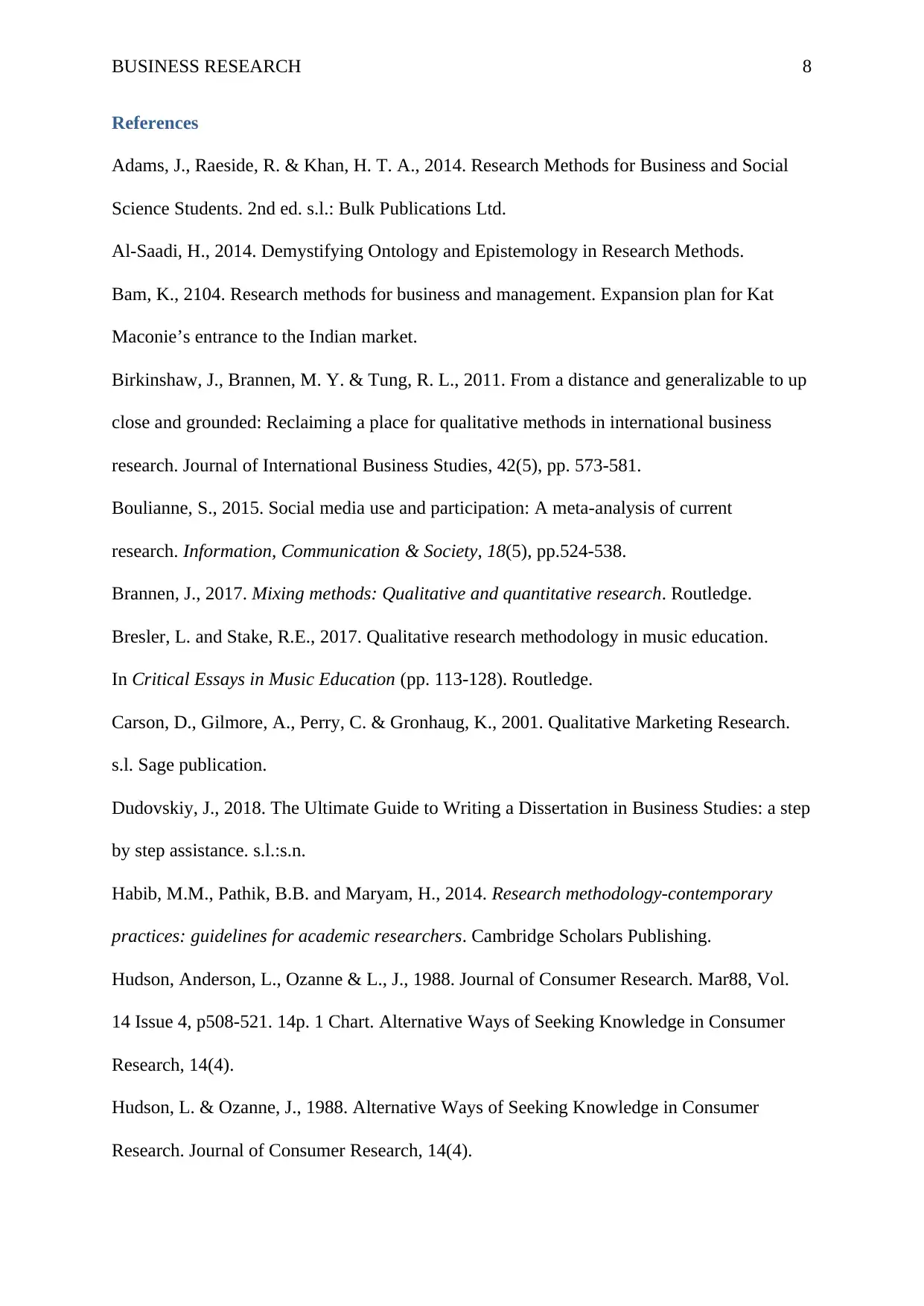
BUSINESS RESEARCH 8
References
Adams, J., Raeside, R. & Khan, H. T. A., 2014. Research Methods for Business and Social
Science Students. 2nd ed. s.l.: Bulk Publications Ltd.
Al-Saadi, H., 2014. Demystifying Ontology and Epistemology in Research Methods.
Bam, K., 2104. Research methods for business and management. Expansion plan for Kat
Maconie’s entrance to the Indian market.
Birkinshaw, J., Brannen, M. Y. & Tung, R. L., 2011. From a distance and generalizable to up
close and grounded: Reclaiming a place for qualitative methods in international business
research. Journal of International Business Studies, 42(5), pp. 573-581.
Boulianne, S., 2015. Social media use and participation: A meta-analysis of current
research. Information, Communication & Society, 18(5), pp.524-538.
Brannen, J., 2017. Mixing methods: Qualitative and quantitative research. Routledge.
Bresler, L. and Stake, R.E., 2017. Qualitative research methodology in music education.
In Critical Essays in Music Education (pp. 113-128). Routledge.
Carson, D., Gilmore, A., Perry, C. & Gronhaug, K., 2001. Qualitative Marketing Research.
s.l. Sage publication.
Dudovskiy, J., 2018. The Ultimate Guide to Writing a Dissertation in Business Studies: a step
by step assistance. s.l.:s.n.
Habib, M.M., Pathik, B.B. and Maryam, H., 2014. Research methodology-contemporary
practices: guidelines for academic researchers. Cambridge Scholars Publishing.
Hudson, Anderson, L., Ozanne & L., J., 1988. Journal of Consumer Research. Mar88, Vol.
14 Issue 4, p508-521. 14p. 1 Chart. Alternative Ways of Seeking Knowledge in Consumer
Research, 14(4).
Hudson, L. & Ozanne, J., 1988. Alternative Ways of Seeking Knowledge in Consumer
Research. Journal of Consumer Research, 14(4).
References
Adams, J., Raeside, R. & Khan, H. T. A., 2014. Research Methods for Business and Social
Science Students. 2nd ed. s.l.: Bulk Publications Ltd.
Al-Saadi, H., 2014. Demystifying Ontology and Epistemology in Research Methods.
Bam, K., 2104. Research methods for business and management. Expansion plan for Kat
Maconie’s entrance to the Indian market.
Birkinshaw, J., Brannen, M. Y. & Tung, R. L., 2011. From a distance and generalizable to up
close and grounded: Reclaiming a place for qualitative methods in international business
research. Journal of International Business Studies, 42(5), pp. 573-581.
Boulianne, S., 2015. Social media use and participation: A meta-analysis of current
research. Information, Communication & Society, 18(5), pp.524-538.
Brannen, J., 2017. Mixing methods: Qualitative and quantitative research. Routledge.
Bresler, L. and Stake, R.E., 2017. Qualitative research methodology in music education.
In Critical Essays in Music Education (pp. 113-128). Routledge.
Carson, D., Gilmore, A., Perry, C. & Gronhaug, K., 2001. Qualitative Marketing Research.
s.l. Sage publication.
Dudovskiy, J., 2018. The Ultimate Guide to Writing a Dissertation in Business Studies: a step
by step assistance. s.l.:s.n.
Habib, M.M., Pathik, B.B. and Maryam, H., 2014. Research methodology-contemporary
practices: guidelines for academic researchers. Cambridge Scholars Publishing.
Hudson, Anderson, L., Ozanne & L., J., 1988. Journal of Consumer Research. Mar88, Vol.
14 Issue 4, p508-521. 14p. 1 Chart. Alternative Ways of Seeking Knowledge in Consumer
Research, 14(4).
Hudson, L. & Ozanne, J., 1988. Alternative Ways of Seeking Knowledge in Consumer
Research. Journal of Consumer Research, 14(4).
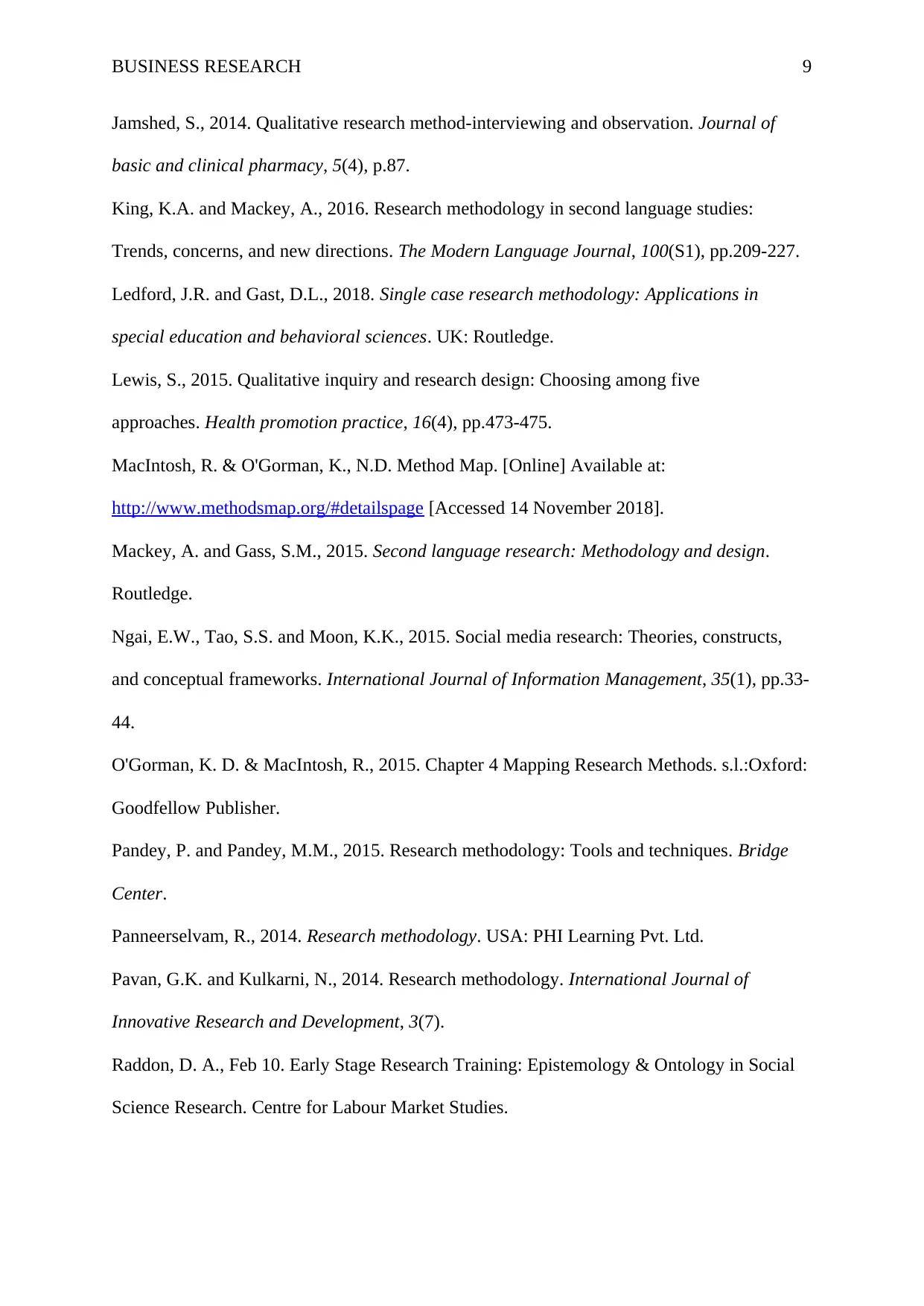
BUSINESS RESEARCH 9
Jamshed, S., 2014. Qualitative research method-interviewing and observation. Journal of
basic and clinical pharmacy, 5(4), p.87.
King, K.A. and Mackey, A., 2016. Research methodology in second language studies:
Trends, concerns, and new directions. The Modern Language Journal, 100(S1), pp.209-227.
Ledford, J.R. and Gast, D.L., 2018. Single case research methodology: Applications in
special education and behavioral sciences. UK: Routledge.
Lewis, S., 2015. Qualitative inquiry and research design: Choosing among five
approaches. Health promotion practice, 16(4), pp.473-475.
MacIntosh, R. & O'Gorman, K., N.D. Method Map. [Online] Available at:
http://www.methodsmap.org/#detailspage [Accessed 14 November 2018].
Mackey, A. and Gass, S.M., 2015. Second language research: Methodology and design.
Routledge.
Ngai, E.W., Tao, S.S. and Moon, K.K., 2015. Social media research: Theories, constructs,
and conceptual frameworks. International Journal of Information Management, 35(1), pp.33-
44.
O'Gorman, K. D. & MacIntosh, R., 2015. Chapter 4 Mapping Research Methods. s.l.:Oxford:
Goodfellow Publisher.
Pandey, P. and Pandey, M.M., 2015. Research methodology: Tools and techniques. Bridge
Center.
Panneerselvam, R., 2014. Research methodology. USA: PHI Learning Pvt. Ltd.
Pavan, G.K. and Kulkarni, N., 2014. Research methodology. International Journal of
Innovative Research and Development, 3(7).
Raddon, D. A., Feb 10. Early Stage Research Training: Epistemology & Ontology in Social
Science Research. Centre for Labour Market Studies.
Jamshed, S., 2014. Qualitative research method-interviewing and observation. Journal of
basic and clinical pharmacy, 5(4), p.87.
King, K.A. and Mackey, A., 2016. Research methodology in second language studies:
Trends, concerns, and new directions. The Modern Language Journal, 100(S1), pp.209-227.
Ledford, J.R. and Gast, D.L., 2018. Single case research methodology: Applications in
special education and behavioral sciences. UK: Routledge.
Lewis, S., 2015. Qualitative inquiry and research design: Choosing among five
approaches. Health promotion practice, 16(4), pp.473-475.
MacIntosh, R. & O'Gorman, K., N.D. Method Map. [Online] Available at:
http://www.methodsmap.org/#detailspage [Accessed 14 November 2018].
Mackey, A. and Gass, S.M., 2015. Second language research: Methodology and design.
Routledge.
Ngai, E.W., Tao, S.S. and Moon, K.K., 2015. Social media research: Theories, constructs,
and conceptual frameworks. International Journal of Information Management, 35(1), pp.33-
44.
O'Gorman, K. D. & MacIntosh, R., 2015. Chapter 4 Mapping Research Methods. s.l.:Oxford:
Goodfellow Publisher.
Pandey, P. and Pandey, M.M., 2015. Research methodology: Tools and techniques. Bridge
Center.
Panneerselvam, R., 2014. Research methodology. USA: PHI Learning Pvt. Ltd.
Pavan, G.K. and Kulkarni, N., 2014. Research methodology. International Journal of
Innovative Research and Development, 3(7).
Raddon, D. A., Feb 10. Early Stage Research Training: Epistemology & Ontology in Social
Science Research. Centre for Labour Market Studies.
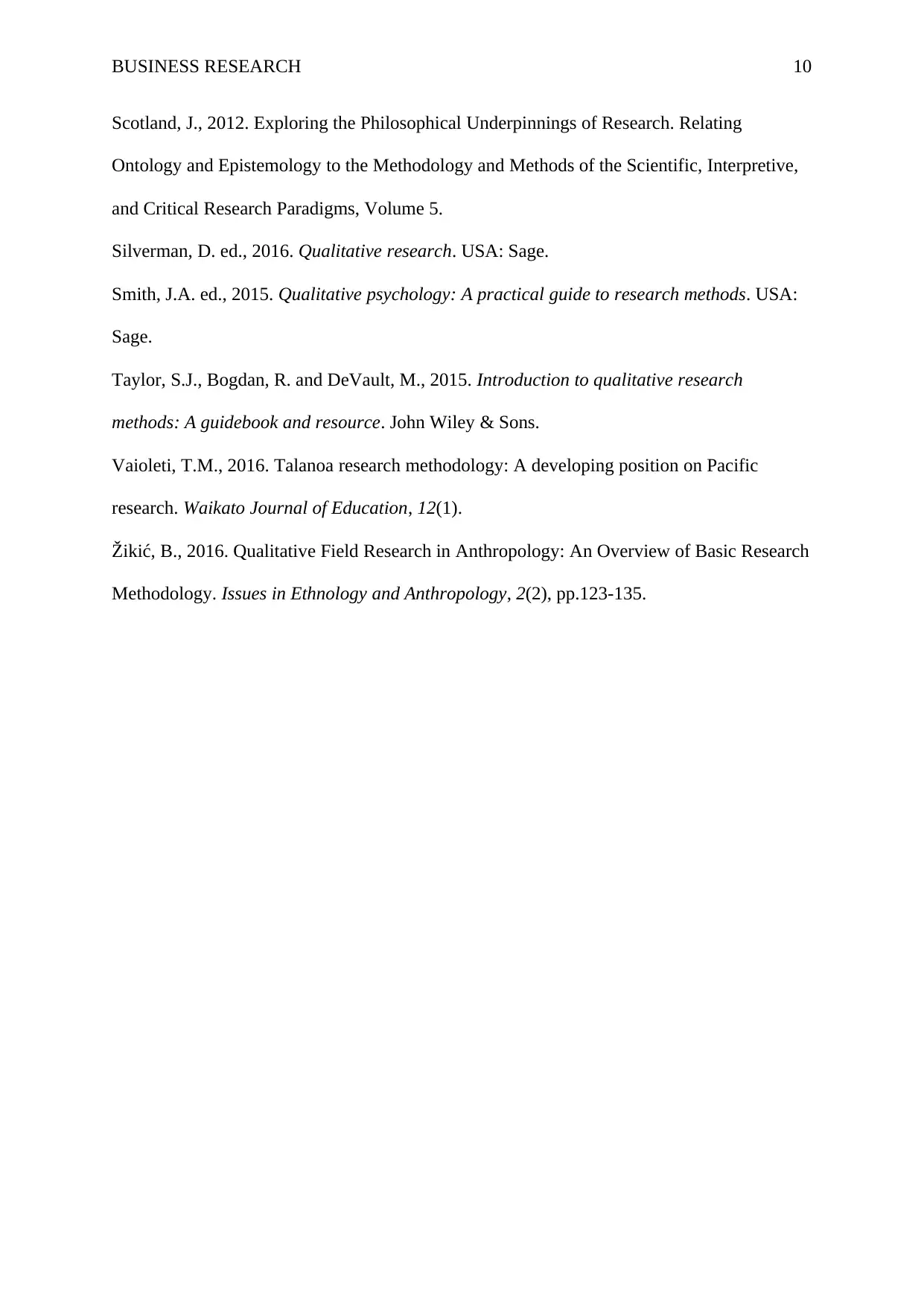
BUSINESS RESEARCH 10
Scotland, J., 2012. Exploring the Philosophical Underpinnings of Research. Relating
Ontology and Epistemology to the Methodology and Methods of the Scientific, Interpretive,
and Critical Research Paradigms, Volume 5.
Silverman, D. ed., 2016. Qualitative research. USA: Sage.
Smith, J.A. ed., 2015. Qualitative psychology: A practical guide to research methods. USA:
Sage.
Taylor, S.J., Bogdan, R. and DeVault, M., 2015. Introduction to qualitative research
methods: A guidebook and resource. John Wiley & Sons.
Vaioleti, T.M., 2016. Talanoa research methodology: A developing position on Pacific
research. Waikato Journal of Education, 12(1).
Žikić, B., 2016. Qualitative Field Research in Anthropology: An Overview of Basic Research
Methodology. Issues in Ethnology and Anthropology, 2(2), pp.123-135.
Scotland, J., 2012. Exploring the Philosophical Underpinnings of Research. Relating
Ontology and Epistemology to the Methodology and Methods of the Scientific, Interpretive,
and Critical Research Paradigms, Volume 5.
Silverman, D. ed., 2016. Qualitative research. USA: Sage.
Smith, J.A. ed., 2015. Qualitative psychology: A practical guide to research methods. USA:
Sage.
Taylor, S.J., Bogdan, R. and DeVault, M., 2015. Introduction to qualitative research
methods: A guidebook and resource. John Wiley & Sons.
Vaioleti, T.M., 2016. Talanoa research methodology: A developing position on Pacific
research. Waikato Journal of Education, 12(1).
Žikić, B., 2016. Qualitative Field Research in Anthropology: An Overview of Basic Research
Methodology. Issues in Ethnology and Anthropology, 2(2), pp.123-135.
1 out of 10
Your All-in-One AI-Powered Toolkit for Academic Success.
+13062052269
info@desklib.com
Available 24*7 on WhatsApp / Email
![[object Object]](/_next/static/media/star-bottom.7253800d.svg)
Unlock your academic potential
© 2024 | Zucol Services PVT LTD | All rights reserved.


